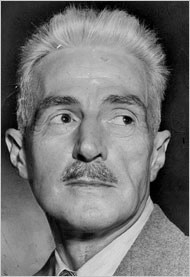
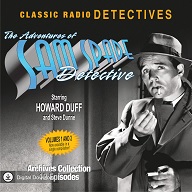 The Adventures of Sam Spade (1946-1951) aired “The Indian Caper” on September 25, 1949 as its 157th episode of approximately 243, only 74 of which are estimated to be still in circulation (this includes 12 AFRS repeats and 2 rehearsal shows). We have previously aired only five episodes of this show, the first in 2014, and the fifth in May of 2022, just over a year ago. For newcomers, and as a refresher for long time listeners, we reprise the historical notes about the origins of Sam Spade as presented for background to that initial episode, with additional material added on the amazing Lurene Tuttle.
The Adventures of Sam Spade (1946-1951) aired “The Indian Caper” on September 25, 1949 as its 157th episode of approximately 243, only 74 of which are estimated to be still in circulation (this includes 12 AFRS repeats and 2 rehearsal shows). We have previously aired only five episodes of this show, the first in 2014, and the fifth in May of 2022, just over a year ago. For newcomers, and as a refresher for long time listeners, we reprise the historical notes about the origins of Sam Spade as presented for background to that initial episode, with additional material added on the amazing Lurene Tuttle.
Sam Spade was the private detective and creation of Dashiell Hammett (1894-1961, photo top right). Based on Hammett’s time as a Pinkerton detective from people he knew or had heard about, Spade first appeared in the third of Hammett’s five novels, The Maltese Falcon, in 1930. Only three other stories, all short works, would feature Spade in magazines and all appeared in 1932. One final Spade story was published in 2013, over 50 years after his death in 1961. The Maltese Falcon was brought to film three times: 1931, 1936, and the now film noir classic of 1941 starring Humphrey Bogart, Peter Lorre, Mary Astor, and Sydney Greenstreet.
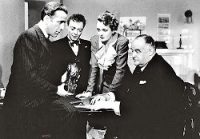
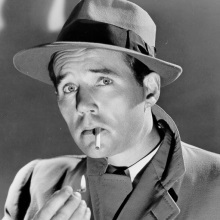 For all but its final radio season Howard Duff (1913-1990, photo at right) would star as Sam Spade and Lurene Tuttle would co-star as Spade’s secretary Effie Perrine. Duff would go on in later years to play various roles in quite a few films, and later with the advent of television would enjoy a lengthy career in many shows as star or character actor (drama and detective primarily) and was an easily recognizable presence on both the silver and small screens. Like Spade’s creator in the late 1940s (pre-HUAC, but Hammett failing to answer a Congressional Committee’s questions under oath stemming from his overt communist dealings), but years later and owing to a different set of circumstances, Duff found himself in the crosshairs of the early 1950s McCarthy-era House Unamerican Activities Committee (HUAC) and was labeled a communist subversive. It was at this point that this soft “blackballing” dovetailed with his burgeoning tv and film career that made it advantageous for him to leave the radio series, at which point Stephen Dunne would take over as the voice of Sam Spade for the series’s final 1950-51 season. According to the writeup by Radio Spirits on their 2014 calendar, on which Duff has the November slot: “A lot of talent came out of the Armed Forces Radio Service at the conclusion of the Second World War. One of the most outstanding examples was an energetic young sergeant named Howard Duff, born on November 24, 1913. A staff announcer for many AFRS features during the war, he was ready for the big time as soon as he doffed the uniform. It didn’t take long for him to land the role of a lifetime, bringing Dashiell Hammett’s legendary private eye Sam Spade to the microphone. In his four years in the role, Duff did the impossible–he replaced Humphrey Bogart’s film version as the definitive embodiment of the Hammett character: tough, yet vulnerable; hardboiled, yet with a sense of humor about his weekly predicaments. Among the legions of postwar radio detectives, Duff’s Spade stood out as one of the few truly originals.”
For all but its final radio season Howard Duff (1913-1990, photo at right) would star as Sam Spade and Lurene Tuttle would co-star as Spade’s secretary Effie Perrine. Duff would go on in later years to play various roles in quite a few films, and later with the advent of television would enjoy a lengthy career in many shows as star or character actor (drama and detective primarily) and was an easily recognizable presence on both the silver and small screens. Like Spade’s creator in the late 1940s (pre-HUAC, but Hammett failing to answer a Congressional Committee’s questions under oath stemming from his overt communist dealings), but years later and owing to a different set of circumstances, Duff found himself in the crosshairs of the early 1950s McCarthy-era House Unamerican Activities Committee (HUAC) and was labeled a communist subversive. It was at this point that this soft “blackballing” dovetailed with his burgeoning tv and film career that made it advantageous for him to leave the radio series, at which point Stephen Dunne would take over as the voice of Sam Spade for the series’s final 1950-51 season. According to the writeup by Radio Spirits on their 2014 calendar, on which Duff has the November slot: “A lot of talent came out of the Armed Forces Radio Service at the conclusion of the Second World War. One of the most outstanding examples was an energetic young sergeant named Howard Duff, born on November 24, 1913. A staff announcer for many AFRS features during the war, he was ready for the big time as soon as he doffed the uniform. It didn’t take long for him to land the role of a lifetime, bringing Dashiell Hammett’s legendary private eye Sam Spade to the microphone. In his four years in the role, Duff did the impossible–he replaced Humphrey Bogart’s film version as the definitive embodiment of the Hammett character: tough, yet vulnerable; hardboiled, yet with a sense of humor about his weekly predicaments. Among the legions of postwar radio detectives, Duff’s Spade stood out as one of the few truly originals.”
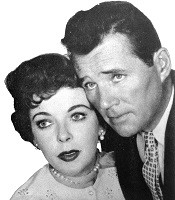 Duff would marry one of the most respected and groundbreaking women actors and directors in film history in 1951, Ida Lupino (1918-1995, Lupino & Duff photo at right). The two would star together in several films throughout the 1950s. As to Duff’s film and television appearances, they are too numerous to mention all of them here, though a sampling may recall him to many a fan of the films and TV shows in which he appeared: Films–The Naked City (1948), While the City Sleeps (1956, with Ida Lupino), and Kramer vs. Kramer (1979); Television–The Rockford Files, The Golden Girls, Knots Landing, Dallas, as “Capt.” Thomas Magnum, II–grandfather of Thomas Magnum starring Tom Selleck on Magnum, P.I. His genre credits include an episode of The Twilight Zone and Batman (“The Entrancing Dr. Cassandra” with Ida Lupino).
Duff would marry one of the most respected and groundbreaking women actors and directors in film history in 1951, Ida Lupino (1918-1995, Lupino & Duff photo at right). The two would star together in several films throughout the 1950s. As to Duff’s film and television appearances, they are too numerous to mention all of them here, though a sampling may recall him to many a fan of the films and TV shows in which he appeared: Films–The Naked City (1948), While the City Sleeps (1956, with Ida Lupino), and Kramer vs. Kramer (1979); Television–The Rockford Files, The Golden Girls, Knots Landing, Dallas, as “Capt.” Thomas Magnum, II–grandfather of Thomas Magnum starring Tom Selleck on Magnum, P.I. His genre credits include an episode of The Twilight Zone and Batman (“The Entrancing Dr. Cassandra” with Ida Lupino).
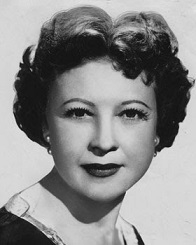
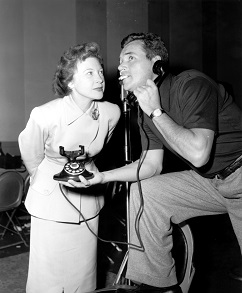 Lurene Tuttle (1907-1986) was known as “The First Lady of Radio,” sometimes appearing in 15 different shows a week. Dragnet, The Whistler, Lux Radio Theater, Suspense, and The Great Gildersleeve were but a scant few of the many shows she would appear in over the years. One of her most memorable roles was as Sam Spade’s secretary Effie Perrine. She also played virtually every other female character on the show as well, a tribute to her immense talent and versatility. She transitioned from vaudeville to radio, and from radio to film and television, appearing in some 50 films (credited and uncredited), and dozens and dozens of television programs, a few of which were Leave it to Beaver, The Andy Griffith Show, Fantasy Island, Dennis the Menace, Little House on the Prairie, Bonanza, Gunsmoke, and I Dream of Jeannie. Lurene Tuttle was honored with two stars on the Hollywood Walk of Fame, one for radio and one for television. She died of cancer on May 28, 1986 in a hospital in Encino, California. Long time Sam Spade co-star Howard Duff delivered her eulogy.
Lurene Tuttle (1907-1986) was known as “The First Lady of Radio,” sometimes appearing in 15 different shows a week. Dragnet, The Whistler, Lux Radio Theater, Suspense, and The Great Gildersleeve were but a scant few of the many shows she would appear in over the years. One of her most memorable roles was as Sam Spade’s secretary Effie Perrine. She also played virtually every other female character on the show as well, a tribute to her immense talent and versatility. She transitioned from vaudeville to radio, and from radio to film and television, appearing in some 50 films (credited and uncredited), and dozens and dozens of television programs, a few of which were Leave it to Beaver, The Andy Griffith Show, Fantasy Island, Dennis the Menace, Little House on the Prairie, Bonanza, Gunsmoke, and I Dream of Jeannie. Lurene Tuttle was honored with two stars on the Hollywood Walk of Fame, one for radio and one for television. She died of cancer on May 28, 1986 in a hospital in Encino, California. Long time Sam Spade co-star Howard Duff delivered her eulogy.
In this episode Sam’s aid is solicited by an elderly Native American chief named Black Cloud. Black Cloud owns a large number of oil wells in Oklahoma, and is now engaged in negotiations with a corporate engineer concerning the business future of the wells. In the middle of discussions the engineer simply disappears (as he has been known to do) and it is Sam’s remit to find him. After meeting in Black Cloud’s hotel suite and agreeing to take the Chief’s case, Black Cloud then asks Sam to put away for safe keeping a valuable wampum belt. Thinking nothing of it Sam later locks the belt in his office safe and goes about his business, but is soon visited by a pretty young Americanized Native American girl—the pretty young Indian “squaw” named White Lilac Sam had seen earlier in Black Cloud’s hotel suite—who warns Sam that old Chief Black Cloud is not the gentle old man he seems, and she implores Sam to give her the belt immediately, for he doesn’t appreciate that it holds the secret to the old chief’s plans to overthrow white civilization in retribution for the white man stealing Indian land, and so must be destroyed at all costs. Sam cannot afford to take the girl’s wild story at face value and refuses. So not only must Sam find and get the missing engineer back to the negotiating table with Black Cloud to fulfill his original contract, he must learn the secret (if White Lilac’s story holds any truth) of the possibly deadly wampum belt. Important, yes, but doable with a bit of luck, until Sam’s office is ransacked and the wampum belt has gone missing. Now this secondary but potentially deadly problem has become his top priority, and feeling the clock ticking Sam forges ahead with all haste to solve the case he calls “The Indian Caper.”
(The linked CD at top includes this episode—under the Indian name Sam gives up on pronouncing, “The Chargogagogmanchogagogchabunamungamog Caper”—and 11 others,)
Play Time: 27:31
{Airing on a Sunday evening in late September meant it was a foregone conclusion the neighborhood gang would meet up at the nearby newsstand after school the next day. Astounding SF (1930-present, now Analog) had been the top market in the field and the favorite of the neighborhood gang for many years. Along with the Poul Anderson novelette as the cover story, among others in that issue were Arthur C. Clarke and L. Sprague de Camp. ASF was a monthly in 1949. The Phantom Detective (1933-53) was Standard Magazine’s answer to Street & Smith’s wildly popular The Shadow magazine. Although its less frequent schedule meant it would eventually publish about half the number of issues as The Shadow, it ran for over 20 years, giving it the record for the longest-running single-character pulp. It saw only 5 issues in 1949 as it was in the process of switching from a bi-monthly to a quarterly. Popular Detective (1934-53) was considered more or less a standard detective pulp, but it ran consistently high quality stories by some of the top practitioners in the field, all of which accounted for its longevity. It was a bi-monthly in 1949.}
[Left: Astounding SF, 9/49 – Center: The Phantom Detective, Fall/49 – Right: Popular Detective, 9/49]
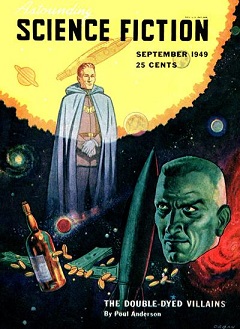
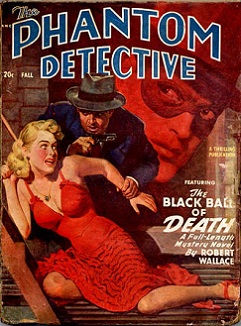
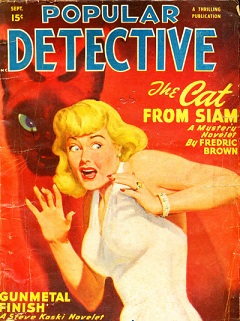
To view the entire list of Old Time Radio episodes at Tangent Online, click here.